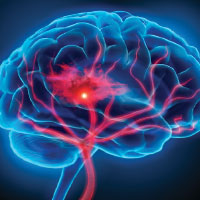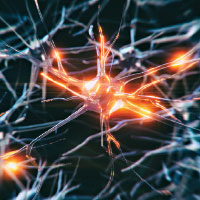Journal Digest: Pediatric Illness and Family Mental Health; Childhood Stroke; and More
Severe Pediatric Illness Affects Mental Health of Entire Family

Parents and siblings of children with life-threatening illnesses have higher rates of health care encounters, diagnoses, and prescriptions than family members of children without a health condition, a study in JAMA Network Open has found.
“The findings of this cohort study, limited to families of children with 1 of 4 [life-threatening conditions], are consistent with increasing evidence that family members of children with [life-threatening conditions] may have increased health care use and poorer mental and physical health,” the authors from the Children’s Hospital of Philadelphia and colleagues wrote.
The researchers analyzed data from Cigna insurance claims between July 2015 and December 2017 to classify families with children having one of four life-threatening conditions: extremely premature birth (≤30 weeks), congenital heart disease, pediatric cancer, or severe neurologic impairment. The final sample included 6,909 children with one of these serious conditions and their families, who were matched with a control group of 18,619 children with no life-threatening conditions and their families.
Compared with families who did not have a child with a serious illness, the parents and siblings of children with these serious illnesses were 55% to 70% more likely to have a health care encounter (hospitalizations, emergency department visits, and urgent care visits) and receive a diagnosis of mental health and/or physical problem and medication. The increased health care use was greatest for families of children with cancer or neurologic problems. For example, mothers of children with cancer or a neurologic impairment were 91% and 85% more likely, respectively, to receive a mental health diagnosis than control parents.
“Compared with case newborn infants in the cardiac and prematurity cohorts, most of whose conditions likely substantially improved after several months, … children in the neurologic and oncologic cohorts were most likely previously healthy and more likely to experience long-duration illnesses with sustained prognostic uncertainty,” the authors wrote. This extended period of uncertainty likely creates additional financial and emotional hardships, which contribute to poorer health in families, they added.
Feudtner C, Nye RT, Boyden JY, et al. Association Between Children With Life-Threatening Conditions and Their Parents’ and Siblings’ Mental and Physical Health. JAMA Netw Open. 2021; 4(12): e2137250.
Childhood Stroke Linked to Long-Term Cognitive Deficits

Having a stroke early in life can impact cognitive abilities years later, according to a study published in Neurology. In particular, youth who had a stroke between the ages of 1 month and 6 years scored lower on cognitive tests compared with youth who had a stroke in their first month of life and those who had a stroke between the ages of 6 and 16 years.
Researchers at University Hospital in Bern, Switzerland, enrolled 52 youth (average age 15) who experienced a stroke at least two years prior and 49 youth with no stroke history (average age 14) for a series of cognitive assessments; these included tests of intelligence, executive function, processing speed, memory, and visual-motor skills. None of the participants had active epilepsy, learning difficulties, or behavioral problems that would affect the cognitive tests.
Average test scores for both groups of children were in the normative range for their ages, but those with a stroke history had slightly lower scores in all cognitive domains tested than controls. Among the stroke patients, those who had an early childhood stroke (between 29 days and 6 years) had lower average cognitive scores than those with a late-childhood stroke (6 to 16 years) or a neonatal stroke (before 28 days). The most significant deficits observed for early childhood stroke patients were for working memory, cognitive flexibility, processing speed, and verbal learning.
“Our results suggest that age at stroke is an important factor for post-stroke recovery and modulates long-term cognitive outcome even when controlling for lesion size and lesion location,” the researchers wrote. . .
Abgottspon S, Thaqi Q, Steiner L, et al. Impact of Age at Pediatric Stroke on Long-term Cognitive Outcome. Neurology. December 16, 2021. Online ahead of print.
Carbamazepine Use Linked with Lower Vitamin D

Use of the anticonvulsant/mood stabilizer carbamazepine may lead to lower vitamin D levels in the blood, according to a meta-analysis in Epilepsy Research.
The researchers from Temple University and Thomas Jefferson University compiled data from 12 studies that measured vitamin D levels in people taking carbamazepine monotherapy (all included studies involved epilepsy patients); the final sample included 331 people on carbamazepine and 328 controls, both children and adults.
Overall, average vitamin D levels in carbamazepine-treated patients was 21.8 ng/mL compared with 28.0 ng/mL in the controls. The differences in vitamin D were not influenced by age, sex, or geographic region (a proxy for sunlight exposure), the authors wrote. In addition, vitamin D differences were not significantly different when controls were healthy individuals or epilepsy patients taking lamotrigine (also used as a mood stabilizer). “This suggests that the lower [vitamin D] levels in carbamazepine-treated patients is not only due to their disease, although future studies should address this further,” the researchers wrote.
They concluded, “[V]itamin D supplementation should be strongly considered for patients prescribed carbamazepine.”
LoPinto-Khoury C, Brennan L, Mintzer S. Impact of Carbamazepine on Vitamin D Levels: A Meta-Analysis. Epilepsy Res. 2021; 178: 106829.
Women With Borderline Personality, Depression May Respond to rTMS

Repetitive transcranial magnetic stimulation (rTMS) may be effective at reducing depressive symptoms in people with borderline personality disorder (BPD), suggests a small clinical study in the Journal of Affective Disorders.
Investigators at the University of Toronto and colleagues enrolled 20 women with comorbid major depressive disorder and BPD for a crossover trial. Over the first three weeks of the study, half the participants received 30 sessions of rTMS therapy (twice daily sessions five days each week) while the other half received a sham stimulation. After a one-week break, the active and sham treatment groups were switched. Each participant’s depressive symptoms were measured with the 17-item Hamilton Rating Scale for Depression (HAM-D) at baseline; at the end of each week during the trial; and at follow-up appointments one, four, and 12 weeks posttreatment.
During the first part of the study, the women who received active rTMS experienced a significant drop in their HAM-D scores after three weeks (from an average of 23.1 to 11.0), while scores among those who received the sham TMS dropped from 23.0 to 17.4. During the second part of the study, HAM-D scores among the women who were new to active rTMS dropped from 17.4 to 11.0 after three weeks, while scores in the women who were new to sham TMS remained relatively stable. At the end of the study, nine of the 16 women who completed both trial phases achieved a treatment response (50% or greater reduction in HAM-D scores), and this response was maintained over the follow-up period.
Feffer K, Lee HH, Wu W, et al. Dorsomedial Prefrontal rTMS for Depression in Borderline Personality Disorder: A Pilot Randomized Crossover Trial. J Affect Disord. December 20, 2021. Online ahead of print.
Cognitive Issues From Diazepam Use May Be Reversible

There is some evidence suggesting that long-term use of benzodiazepines may cause irreversible cognitive damage that can increase the risk of dementia in older adults. An animal study published in Translational Psychiatry now suggests that cognitive problems associated with benzodiazepines may resolve when not taking the medication.
Investigators at the University of Lille in France administered regular food pellets or pellets supplemented with either 15 mg/kg or 30 mg/kg diazepam to groups of male mice (aged 6 months and 12 months) daily for 16 weeks followed by a one-week wash-out period when all mice received regular food. The researchers conducted two rounds of behavioral assessments during the study: once after eight weeks and again following the wash-out period.
After eight weeks, mice in both diazepam groups (15 mg/kg and 30 mg/kg) showed deficits in working memory compared with mice in the regular food group, though only the 15 mg/kg group reached a statistical significance; the effects of diazepam were similar in the 6- and 12-month-old mice.
At the 17-week assessments, the researchers found no differences in working memory among any of the three groups of mice. The animals also performed similarly on spatial and visual memory tasks.
The researchers acknowledged that the exclusion of female mice from the study is a significant limitation, but that the results “provided evidence that diazepam alone was not able to durably impair memory skills and that both dose- and age-related factors did not influence the long-term cognitive outcomes.” ■
Carton L, Niot C, Kyheng M, et al. Lack of Direct Involvement of a Diazepam Long-Term Treatment in the Occurrence of Irreversible Cognitive Impairment: A Pre-Clinical Approach. J. Transl Psychiatry. 2021; 11(1): 612.



